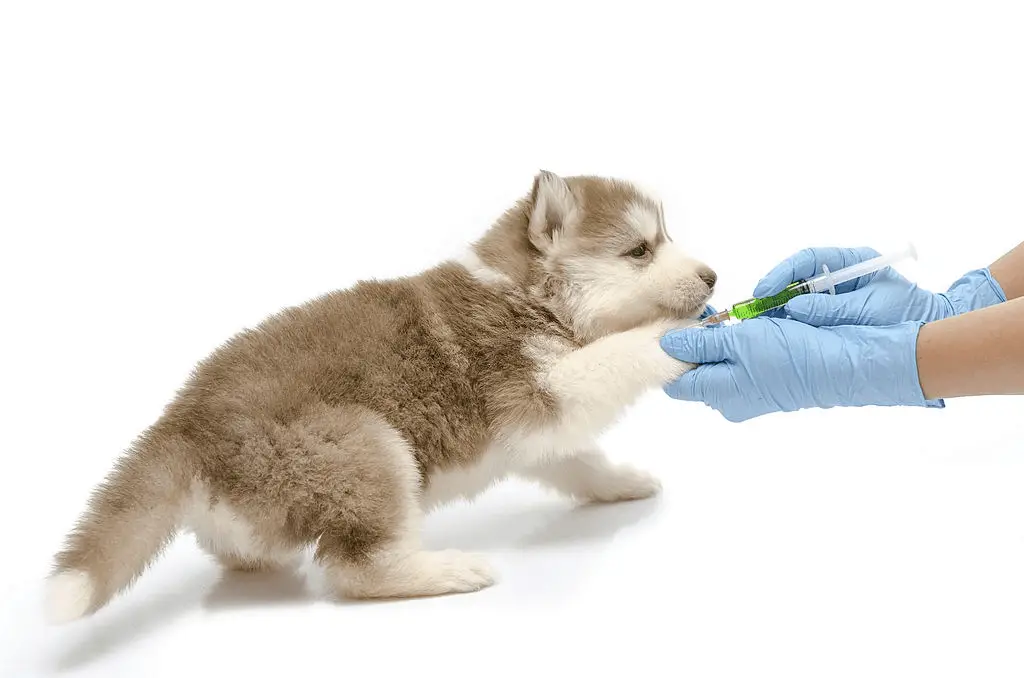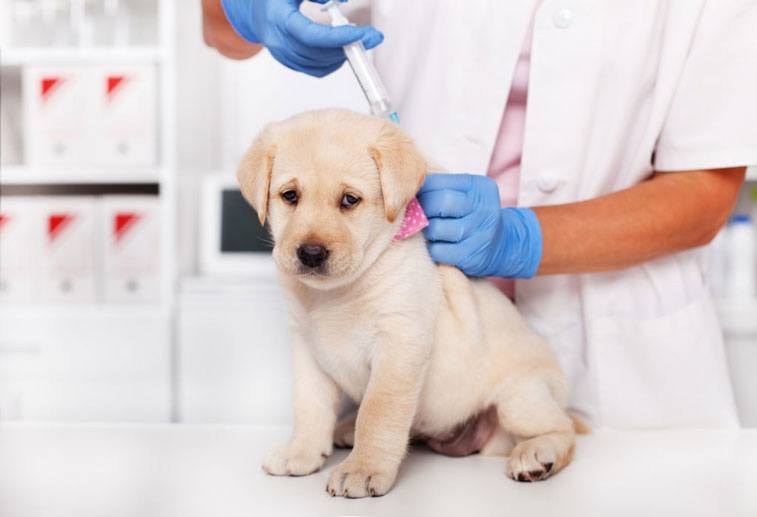Last Updated on 11/05/2020 by Veronica Jones

One of the most important tasks of a new puppy owner is keeping them safe through a proper vaccination schedule. Our beloved pups are the most vulnerable to infectious disease during their adolescent period, so it’s up to us to give them the very best chance at health!
In this article we’ll dive into the science behind a puppy vaccination schedule, the standard vaccines your puppy should have, and the vaccine schedule you should follow.
Why are vaccines important?
When it comes to infectious diseases that can affect our dogs, you may be surprised at how many places can be potentially dangerous for an unvaccinated dog. Viruses can hangout in the soil in your yard, in the grass and water bowls at the dog park, in pet stores, and virtually any other surface that a dog has touched. It only takes a second for your puppy to be exposed to a deadly disease, making a proper vaccination schedule so important in the fight to keep them healthy.
Our puppies are born with some maternal antibodies that fight off foreign invaders, but these antibodies only remain in their system for so long. These antibodies begin to fade away at 6 weeks of age, making them vulnerable to any virus that crosses their path. A puppies’ immunity is also in direct result of their mother’s defenses, so if their mother has never been vaccinated, it’s as if a newborn puppy is at risk from the moment they are born.
Vaccines are the easiest and most effective way to keep your puppy as healthy as possible, and set them up for a thriving future. Now that you understand how important vaccines are for your furry friend, let’s dive into which vaccines your puppy will need.
What vaccines do puppies need?
While each area will have their own set of recommended vaccines based on risks that are in the environment, there are a few core vaccines that every state and country considers to be essential. The core vaccines for all puppies include the vaccines for:
- Rabies: A viral disease of mammals that affects the central nervous system and is always fatal without medical intervention. Rabies will cause severe neurological symptoms when the animal is infected, and is contagious through any type of secretion. Since this is the most fatal condition for all animals, most states require a rabies vaccine for each pet.
- Parvovirus: A viral gastrointestinal disease that attacks the lining of the gastrointestinal tract, leading to severe vomiting, diarrhea, bloody diarrhea, and eventually death when not treated. Parvovirus is also incredibly contagious in bodily secretions, meaning it spreads rapidly in areas that dogs frequent.
- Distemper: A virus that attacks the gastrointestinal, nervous, and respiratory system in dogs. Puppies and dogs with distemper can develop life threatening pneumonia and severe neurological systems that greatly impact the nervous system. Distemper can be spread through contact with contaminated objects, as well as through air droplets.
- Canine hepatitis: A viral infection that attacks the liver, kidneys, spleen, lungs, and the eyes of an infected dog. Canine hepatitis will often lead to gastrointestinal symptoms, severe liver impact, and death without medical treatment.
Other vaccines depend on the risks in the area in which you live and your dog’s daily habits. Some other vaccines that are beneficial, but not considered core vaccines include:
– Bordetella bronchiseptica (kennel cough)
– Parainfluenza (Canine flu)
– Leptospira bacteria (leptospirosis)
– Borrelia burgdorferi (lyme disease)
Puppy Shot Schedule By Vaccine
DHLPP (Distemper, Parvo, Lepto, Hepatitis, Parainfluenza)
This is a common combination vaccine that you’ll find in most animal clinics around the US and other parts of the world. Some vaccines will not include the Leptospirosis protection, and may offer that separately, but the schedule is still the same.
- 1st vaccine: 6-8 weeks
- 2nd vaccine: 9-11 weeks
- 3rd vaccine: 12-14 weeks
- 4th vaccine: 16-17 weeks
- Booster vaccine: 12 months
Rabies
Rabies vaccine rules vary from state to state, but typically start at the 16 week age mark. Rabies vaccines come in the form of either 1 year boosters or 3 year boosters, so make sure you understand your puppy’s vaccine type at their first visit.
Bordetella
While this is not considered a core vaccine, the bordetella vaccine is recommended for any dog that goes out to public settings. This includes doggie daycares, dog parks, pet stores, and similar environments. Many of these places will even require proof of a bordetella vaccine to allow your dog entry.
- 1st vaccine: 14-16 weeks
- Booster vaccine: 6 months
Lyme Disease
Since some parts of the world are known to have higher instances of lyme disease than others (such as areas in the northern US), some veterinarians will recommend this vaccine if they feel that your dog is at risk. If you are unsure of the risks in your area, just ask your vet.
- 1st vaccine: 14 weeks
- 2nd vaccine: 17 weeks
- Booster vaccine: 12 months
What if the schedule is not followed?
While the first set of vaccines for your puppy can seem a bit confusing, there’s a good reason behind the method. The idea behind a proper vaccination schedule for your puppy is to work with their body’s natural antibodies in a schedule that sets them up for long term protection.
“During this critical time, maternal antibody from the mother can interfere with a long-term immune response, so the idea is to keep boosting until the pet’s immune system is capable of creating its own long-term protection,” – Dr. Jessica Vogelsang, author of All Dogs Go to Kevin.
The vaccine schedule is designed to keep boosting the immune system through a series of vaccines in order to build up an immunity to the virus or bacteria that the vaccine protects against. By spacing out their vaccines by 2-4 weeks in between each injection, their body is able to create an antibody titer that will give your puppy immunity for the next year of their life.
When this schedule is not followed, your puppy may not build the proper immunity against harmful viruses. For example, if your puppy receives 2 parvo vaccines instead of 4, their body will not be fully protected against the virus and can still catch it when exposed. This is the same risk your dog faces if their vaccines are spaced out improperly, or if they begin their vaccines before 6 weeks of age.
The only way to keep your pup safe from harmful agents is by following the standard vaccine schedule, keeping them away from public places until they are fully vaccinated, and keeping up with their yearly vaccine boosters.
Risks Of Not Giving Vaccines

Since you can’t see the tiny viruses and bacteria that cross your puppy’s path, it’s impossible to know if you are keeping them safe and out of harm’s reach. Vaccines are a way to protect your puppy against the things you cannot see or control, and ensure a long and happy friendship with your new addition to the family.
Having an unvaccinated puppy is a gamble, and can even be risky for puppies that don’t go out to public places. Diseases like parvovirus are known to hangout in the soil and other contaminated surfaces for up to 3 years at a time, meaning it can be present in unexpected places.
Some unvaccinated young dogs have contracted parvovirus after moving into new homes, likely due to the virus being present in their new backyard. The only way to ensure your dog’s protection in the early years of their life is through vaccination.
Another thing to keep in mind is how many of these diseases can affect dogs of all ages. While many people view parvovirus as a “puppy disease”, it can actually impact dogs up to 4 years of age on average. Distemper, leptospirosis, bordetella, parainfluenza, corona and lyme disease can also impact dogs of all ages as well. This shows how important not only their first rounds of the vaccine are, but also their booster vaccines in the years to come.
Summary
We know this can all seem a bit overwhelming, but your veterinarian is on your side when it comes to making this process stress free. Clinics are now equipped to educate clients on the importance of vaccines throughout each stage of your dog’s life, and are dedicated to reminding you about each vaccine that is due along the way.
With your new education on the importance of vaccines on your side, your pup is sure to have a bright and healthy future. Make sure to contact your local vet to begin your puppy’s vaccine schedule, and they will handle the rest!
